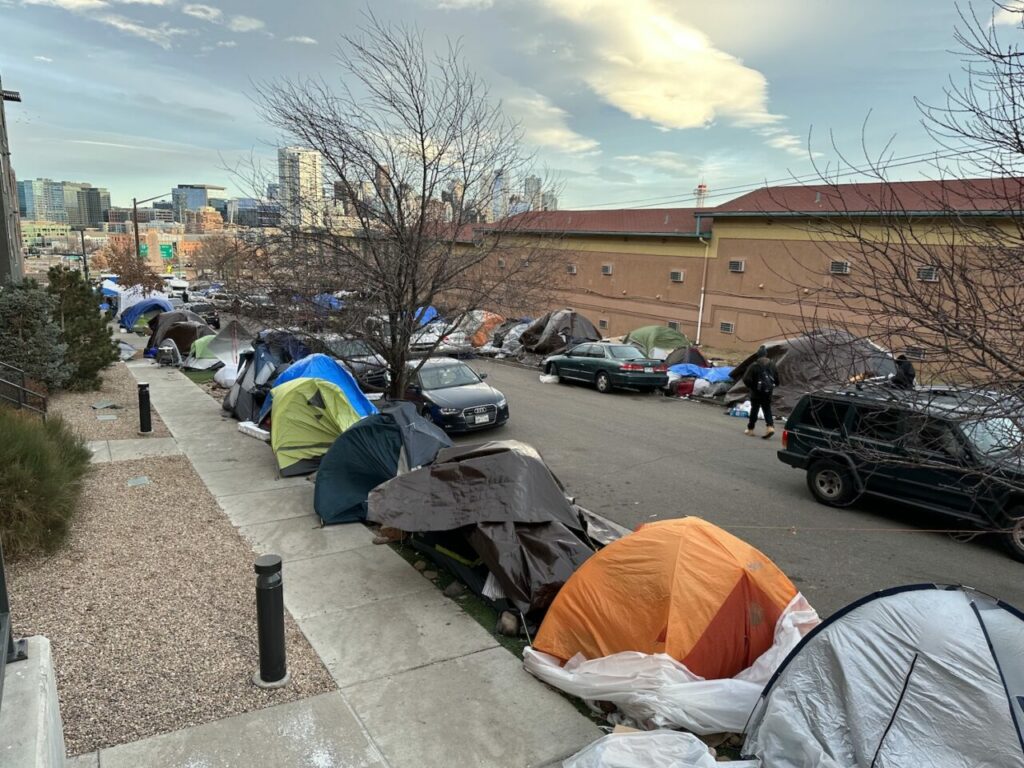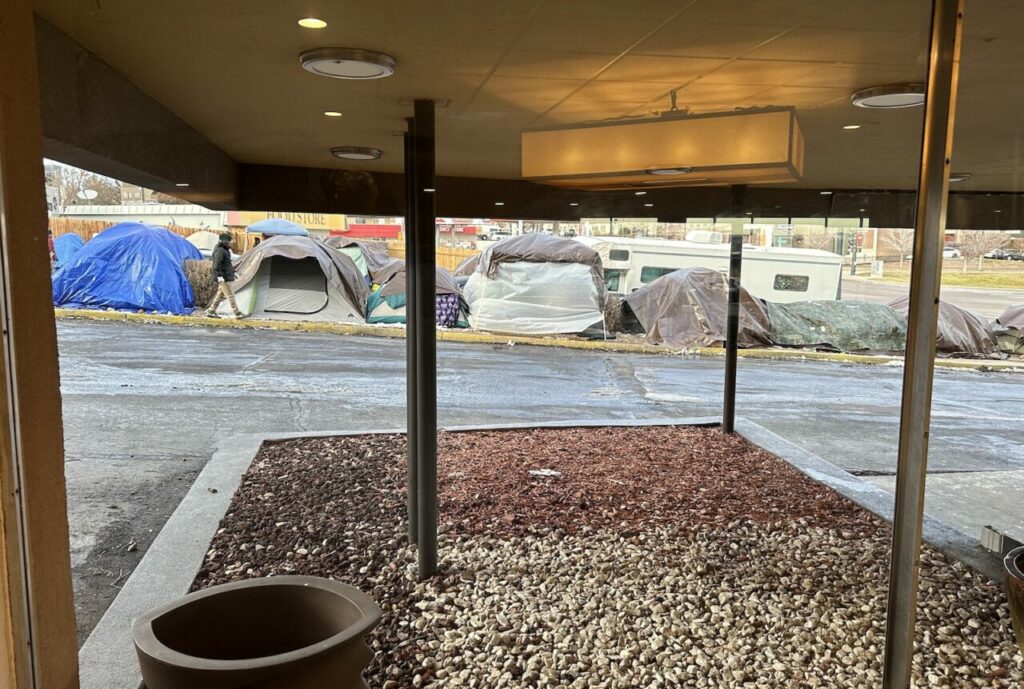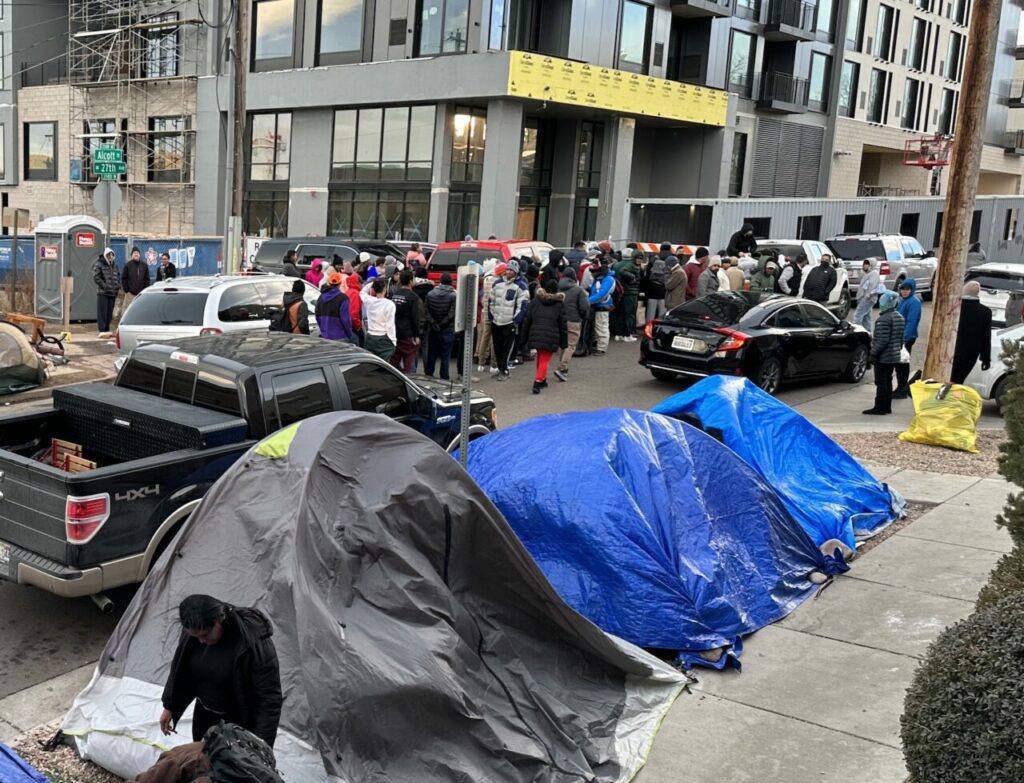By Cassis Tingley

The corner of Zuni and Speer has become a microcosm of the intensifying Venezuelan humanitarian crisis, the American immigration system fiasco and local politics here in Denver. Over 200 refugees and migrants, primarily from Venezuela, have set up camp outdoors along West 27th Avenue.
Inside the neighboring Quality Inn, migrant families and individuals eligible to be sheltered by the city stay in hotel rooms, receive two meals a day and are assured housing for 14 days if they’re traveling by themselves or with other adults and 37 days if they have kids. Services, whether they be clothing donations, a list of community nonprofits or housing help, must come through the city and their partner nonprofits, Papagayo and ViVe Wellness.
“After that time frame, [the migrants] are being exited to the street,” said Andrea Ryall, who has been organizing advocacy efforts. “We don’t believe that they are being set up in a way to be exited anywhere else.”

As of earlier this month, the City of Denver had served more than 30,000 migrants out of the city reception center since last December. City spokesperson Jon Ewing said that about 7,000 migrants indicated on arrival that they did not want to stay in Denver and were provided with a bus ticket to another city; approximately 7,800 migrants have been sent to Denver on buses chartered by Texas government officials. So far, the city has spent more than $33 million on the support effort.
Ewing said migrants released from shelters have access to “any resources available to any other person [experiencing homelessness] in Denver.” But without work authorization, the money for a deposit or a first-month’s rent, and English language skills, many have no other option but to move onto the street.
Eduardo Moncerrat, a 21 year-old migrant from Venezuela, plans to do just that. As a young man traveling alone, he has six days left of his 14 allotted days in the Quality Inn.
“If I can’t find work, I will find a tent and live here like everyone else,” he said, gesturing to rows of tents lining both sides of the street.
The Refugees
Most of the refugees and migrants staying in and camping outside the Quality Inn are from Venezuela.
Today, widespread blackouts, out-of-control inflation and rampant government corruption have resulted in many Venezuelans facing financial ruin, violence and extortion. Since President Nicolás Maduro took power in 2013, approximately 7 million Venezuelans have fled the country in search of safety and stability abroad, with at least 500,000 seeking asylum in the U.S. since 2020.
Edwin Contreras, 35, left Venezuela after being told he had to pay a weekly $100 vacuna, or “vaccine” to ensure his safety, to an infamous organized crime group in Venezuela.
“The one time I didn’t have it, they came and almost killed me,” said Contreras. “They said I had 15 days to pay or they would kill me … I didn’t have any other options.”
Like Contreras, Jessica Romero, 23, came to the U.S. after her husband faced extortion and violent threats this past spring. In Romero’s case, the threats came from the local colectivo, far-left paramilitary groups with ties to the Venezuelan government and operate throughout Venezuela.
After traversing Colombia, Panama, Costa Rica, Nicaragua, Honduras, Guatemala and Mexico, all largely on foot, Romero arrived in Juarez and was granted entry into the U.S. in El Paso. The journey through Mexico was the worst, she said.
“They kidnapped girls, they robbed my husband at gunpoint and took our money,” Romero said. “Crossing the Mexican border we learned that we have to keep fighting for our lives … if we have a family, if we have kids, we have to fight for them too.”
From El Paso, where she gathered chile peppers for several weeks, Romero and her family traveled to San Antonio before leaving for Denver in search of better work. When she and her husband first arrived, he found a job and the family moved into an apartment. But after the first snowfall, Romero said, the work stopped.
As her husband had already sent his salary back to his family in Venezuela, they couldn’t make rent and were forced to move into the Zuni encampment; the Romeros have applied for housing assistance from ViVe Wellness but are still waiting to hear back.

The Encampment
Like most of the migrants at the Zuni encampment, the Romeros now have a tent, tarp, air mattresses, bedding and winter clothing. Volunteers from the community stop by to bring hot meals for lunch, and neighbors have set up a free community closet in a church several blocks to the north. Romero enrolled her daughter, who is 8, in a nearby elementary school.
These initiatives are not managed by the city. They’re the work of the Highland Moms, a neighborhood organization of moms and community members which, until last month, was a forum for parents in North Denver to discuss and organize local events and happenings.
This changed when Andrea Ryall stopped by the Quality Inn to drop off bananas for Mutual Aid Monday in early November.
Instead of a clear drop-off location and outreach workers, Ryall was met with a crowd of kids and moms, many without shoes or coats. She was shocked.
“That first night,” Ryall recalled, “I did the most radical thing for me. I put a mom in my car and took her and got her dinner because she looked me dead in the eyes and hugged me and said, ‘My kids haven’t eaten today, can you please help?’”
The Moms
After the banana incident, Ryall took to Facebook to rally her counterparts to respond to the international crisis that had landed squarely in their neighborhood. Less than a month later, the Highlands Moms & Neighbors – Venezuelan Migrant Support Facebook group has more than 2,400 members and sees hundreds of posts each day, ranging from coordinating furniture drop-off to advocating for specific families.
A team of 26 moms have delegated responsibilities into four prongs: immediate physical needs, resource navigation, advocacy and communications. Tasks range from navigating legal clinics to organizing meals at the camp. There are spreadsheets detailing specific family needs, donation and volunteer opportunities, resources for migrants, a directory of bilingual translators, donation drop-off locations, housing options, available furniture and housewares, and local business donors.
“The activity, and the spontaneity, and the outpouring and self organizing … is incredibly dynamic,” said Rudy Garcia, who describes himself as a longtime Northside resident. Garcia periodically stops by the encampment to help migrants with moving and finding odd jobs. “It’s like nothing I’ve seen since the Chicano movement in the ’70s.”
While Ryall is proud of the community mobilization, the scale of their work makes her wonder: where is the city?
“We want face-to-face meetings and true communication because we’re doing the boots-on-the-ground work, but what we’re doing isn’t sustaining a long-term life for them here,” Ryall said. “Whatever services [the city] has, they have to start taking it to the people.”
Ewing said that, in addition to stretching funding and staffing to its limits, the city has been focusing its resources on housing families, not individuals.
“We have not actually discharged a family since Nov. 17,” said Ewing. “At the moment, we’re in conversation of next steps.”
Despite the city’s promise that it ended the discharge of families in mid-November, there have been numerous reports on the Highlands Moms Facebook group of families being kicked out of shelters for violating shelter rules, often around accepting food and donations from non-city entities. Ryall pointed out that several families were still living in tents over Thanksgiving.
“Volunteers were out there at one o’clock in the morning, on Thanksgiving night, looking for kids in tents and counting them and calling in favors to house them,” she said.
Ewing went on to call the effort to house solo migrants “multipronged,” saying “the outreach teams are out there, the nonprofits are out there every day.” These “outreach teams” are part of Denver’s street outreach collaborative, one aspect of Denver’s housing stability initiative.
Neither Contreras nor Giovany Gonzalez, an asylum-seeker from Maracaibo, Venezuela, had met with or heard of city employees at the Zuni encampment when The Denver North Star met with them.
“It’s the community that’s been helping us, not the government,” said Gonzalez. “The only thing [the government] has done is allow us to stay here.”
The Work Permits
The city, the moms and the asylum seekers all agree on one thing: the asylum seekers and migrants need employment.
“People are finding jobs immediately,” said Ewing, “but often it’s day labor stuff.”
Gonzalez, Contreras, Romero and Moncerrat have been looking for work for weeks, even months, without success.
Romero has experience working in beauty salons doing nails and hair but is also open to cooking, cleaning and any other work she can find. The men were seeking any kind of manual labor, including construction, drywall, even fishing and welding.
“Many people have supported us,” said Gonzales. “But I think that with just one opportunity to work, we could solve all of these issues that we’re facing right now.”
Ryall acknowledged that while the community can put together donation drives and hot meals, it is not a sustainable solution to what is becoming a long-term problem.
“They need more than boots and jackets and shampoo and lunch, they need to be able to start a life,” Ryall said.
Work authorization for asylum seekers is tricky. The Biden administration granted all Venezuelan asylum seekers who arrived in the U.S. between March 8, 2021, and July 31 Temporary Protected Status (TPS), a blanket legal status afforded to all Venezuelans regardless of individual circumstances. However, Venezuelans who entered the country after July 31 are subject to the asylum application process, which can take months to complete.
Venezuelans covered under TPS are eligible to apply for work authorization, while general asylum seekers are eligible to apply only after they’ve been seeking asylum in the U.S. for over 150 days. Migrants who were paroled into the U.S. using CBP One™, a U.S. Customs and Border Protection mobile app, are also eligible.
However, to stay in Denver shelters, migrants must have arrived in the U.S. within the last 30 days. This means that many of the migrants at the Zuni encampment have been in the U.S. for a much shorter period of time and are not eligible to apply for work permits.
For migrants who may be eligible for work authorization, the application comes with a $410 fee.
Ewing pointed out that the federal government offers fee waivers to make work authorization more accessible; however, to qualify for a fee waiver, the applicant must show that their income is under 150% of the federal poverty line, that they are participating in a means-tested government benefits program, i.e., Medicaid or Supplemental Nutrition Assistance Program (SNAP), or that they are suffering from financial hardship.
Asylum seekers in Colorado are not eligible to apply for means-tested government benefits programs until their asylum case is approved. While they can technically show financial hardship through pay stubs, bills, or bank statements, this evidence can be difficult to collect and must be translated to English to be considered valid by the federal government.
In addition, while instructions to complete the fee waiver are available online in Spanish, the waiver itself is only available in English and must be printed out and mailed to a U.S. Citizenship and Immigration Services office, posing yet another barrier to applicants living on the street.
Ewing emphasized that all work authorization is handled by the U.S. government and is out of the city’s hands.
“The federal government has to expand this work authorization because, what else are we gonna do?” Ewing said. “The only other option for these people is to go work under the table, and I’m sure many of them will go do that because they want to provide for their families, but … that’s how people get exploited. That’s how people get underpaid.”
Alongside mayors from Chicago, Houston, New York and Los Angeles, Denver Mayor Mike Johnston requested additional federal funding for Denver’s response and the expansion of work authorization to “anyone with an Alien Registration Number” from President Joe Biden last October. The president has not responded.
“We don’t want to go at governmental pace here,” Ryall said. “The winter is coming … what next?”
“Even I can see that if we already had better policy and safeguards in place to protect Colorado citizens from homelessness,” Ryall said, “if we were not sweeping camps on a regular basis and leaving people with absolutely nothing, if we were setting them up to not be on the street … we would not be in this crisis. … You throw more people into that failure, [and] that’s where we find ourselves in a straight-up humanitarian crisis.”

Be the first to comment